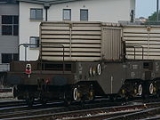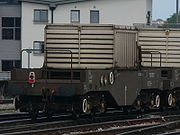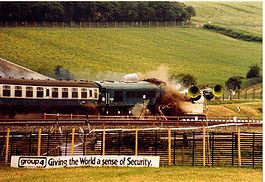
Nuclear flask
Encyclopedia

Shipping container
A shipping container is a container with strength suitable to withstand shipment, storage, and handling. Shipping containers range from large reusable steel boxes used for intermodal shipments to the ubiquitous corrugated boxes...
that is used to transport active nuclear materials between many nuclear power stations in the UK
Nuclear power in the United Kingdom
Nuclear power currently generates around a sixth of the United Kingdom's electricity. As of 2011, the United Kingdom operates 19 nuclear reactors at nine locations...
. Each flask weighs more than 50 tonnes, and transports usually not more than 2.5 tonnes of spent nuclear fuel.
Description
Introduced in the early 1960s, MagnoxMagnox
Magnox is a now obsolete type of nuclear power reactor which was designed and is still in use in the United Kingdom, and was exported to other countries, both as a power plant, and, when operated accordingly, as a producer of plutonium for nuclear weapons...
flasks consists of 4 layers; an internal skip
Skip (container)
A rubbish skip is usually called merely a skip or waste bin. A skip is a large open-topped container designed for loading onto a special type of lorry. Differing from dumpster, instead of being emptied into a waste vehicle onsite, a skip is replaced by an empty skip and then tipped at a landfill...
containing the waste; guides and protectors surrounding the skip; all contained within the 14 inches (355.6 mm) steel main body of flask itself, with characteristic cooling fins; and (since the early 1990s) a transport cabin of panels which provide an external housing. Flasks for waste from the later advanced gas cooled reactor power stations are similar, but have less thick steel main walls at 3-inch thickness to allow room for extensive internal lead shielding. The flask is protected by a bolt
Bolt
-Fasteners:*A cap screw, as used in a bolted joint*Screw, a cylindrical threaded fastener*Dead bolt, a kind of locking mechanism*Bolt , an anchor point used in rock climbing-Weaponry:*Bolt , a mechanism used in firearms...
hasp
HASP
HASP can refer to:*Homeowners Affordability and Stability Plan*Hardware Against Software Piracy, a type of dongle*Houston Automatic Spooling Priority a system program for IBM System/360 and IBM System/370 mainframe computer systems*Aladdin HASP Dongles...
which prevents the content from being accessed during transit.
Transport
All the flasks are owned by the Nuclear Decommissioning AuthorityNuclear Decommissioning Authority
The Nuclear Decommissioning Authority is a non-departmental public body of the United Kingdom formed by the Energy Act 2004. It came into existence in late 2004, and took on its main functions on 1 April 2005...
, the owners of Direct Rail Services
Direct Rail Services
Direct Rail Services is a freight operating company created by British Nuclear Fuels Limited. The company started rail operations in 1995 using five heavily refurbished Class 20/3 diesel locomotives. Since then it has expanded greatly, and has acquired many more locomotives, most bought...
. A train conveying flasks would be hauled by two locomotives, either Class 20
British Rail Class 20
The British Rail Class 20, otherwise known as an English Electric Type 1, is a class of diesel-electric locomotive. In total, 228 locomotives in the class were built by English Electric between 1957 and 1968, the large number being in part because of the failure of other early designs in the same...
or Class 37
British Rail Class 37
The British Rail Class 37 is a diesel-electric locomotive. Also known as the English Electric Type 3, the Class was ordered as part of the British Rail modernisation plan....
, but Class 66
British Rail Class 66
The Class 66 is a six axle diesel electric freight locomotive developed in part from the British Rail Class 59, for use on the railways of the UK. Since its introduction the class has been successful and has been sold to British and other European railway companies...
locomotives are increasingly being used. Locomotives are used in pairs as a precaution in case one fails en route. Greenpeace
Greenpeace
Greenpeace is a non-governmental environmental organization with offices in over forty countries and with an international coordinating body in Amsterdam, The Netherlands...
protest that flasks in rail transit pose a hazard to passengers standing on platforms, although many tests performed by the Health and Safety Executive
Health and Safety Executive
The Health and Safety Executive is a non-departmental public body in the United Kingdom. It is the body responsible for the encouragement, regulation and enforcement of workplace health, safety and welfare, and for research into occupational risks in England and Wales and Scotland...
have proved that it is perfectly safe for passengers to stand on the platform while a flask passes by.
Safety

British Rail Class 46
The British Rail Class 46 is a class of diesel locomotive. They were built from 1961-1963 at British Railways' Derby Works and were initially numbered D138-D193. With the arrival of TOPS they were renumbered to Class 46. Fifty-six locomotives were built...
locomotive was forcibly driven into a derailed flask (containing water and steel rods in place of radioactive material) at 100 miles per hour, the flask sustaining minimal superficial damage without compromising its integrity, while both the flatbed wagon carrying it and the locomotive were more-or-less destroyed. Additionally, flasks were heated to temperatures of over 800 °C to prove its safety in a fire. However, critics consider the testing flawed for various reasons. The heat test is claimed to be considerably below that of theoretical worst case fires in a tunnel, and the worst case impact today would have a closing speed of around 170 miles per hour. Nevertheless there have been several accidents involving flasks, including derailments, collisions and even a flask being dropped during transfer from train to road, with no leakage having occurred in any case.
Problems have, however, been found where flasks "sweat", that is, where small amounts of radioactive material absorbed into paint migrate to the surface causing contamination risks. Studies identified that 10–15% of flasks in the United Kingdom
United Kingdom
The United Kingdom of Great Britain and Northern IrelandIn the United Kingdom and Dependencies, other languages have been officially recognised as legitimate autochthonous languages under the European Charter for Regional or Minority Languages...
were suffering from this problem, but none exceeded the international recommended safety limits. Similar flasks in mainland Europe were found to exceed the safety during testing and additional monitoring procedures were put into place. In order to reduce the risk current UK flask wagons are fitted with a lockable cover to ensure any surface contamination remains within the container and all containers are tested before shipment, with those exceeding the safety level being cleaned until they are within the limit.
Probably the most comprehensive safety study was the report Nuclear Waste Trains Investigative Committee: Scrutiny of the transportation of nuclear waste by train through London, October 2001. This report identified risks in the areas of emergency polices and particularly in the area of security of sites such as marshalling yards where there was a risk of terrorist attack.
External links
- Nuclear Transports in Britain (1999), Cumbrians Opposed to a Radioactive Environment
- Crash! Pictures of the 1984 train-crash test
- Operation Smash Hit Publicity film made for the CEGBCEGBThe Central Electricity Generating Board was the cornerstone of the British electricity industry for almost 40 years; from 1957, to privatisation in the 1990s....
(subsequently Magnox Electric Ltd) about the train-crash test - Risks of transporting of irradiated fuel and nuclear materials in the UK, Large & Associates, for GreenpeaceGreenpeaceGreenpeace is a non-governmental environmental organization with offices in over forty countries and with an international coordinating body in Amsterdam, The Netherlands...
(2007) - Background Report on the Basic Issues to be Addressed, QuantSci Limited, for the Greater London AuthorityGreater London AuthorityThe Greater London Authority is the top-tier administrative body for Greater London, England. It consists of a directly elected executive Mayor of London, currently Boris Johnson, and an elected 25-member London Assembly with scrutiny powers...
(2001)

